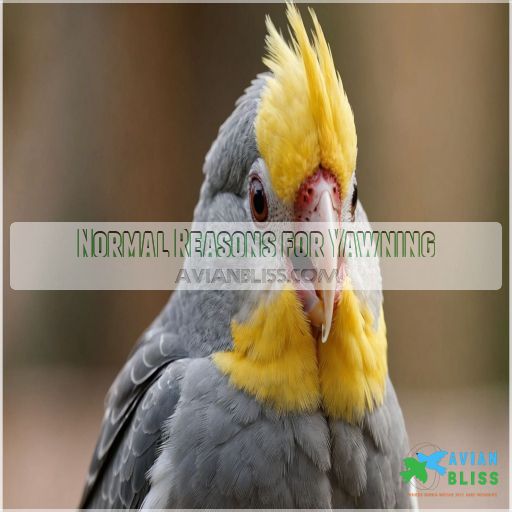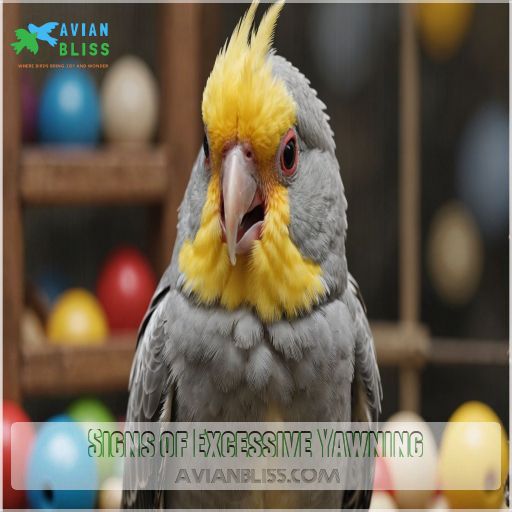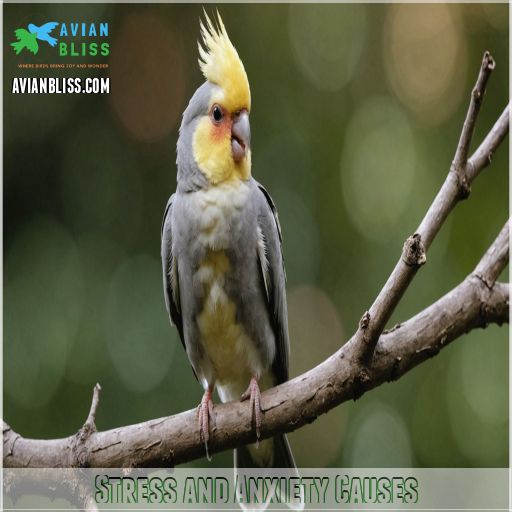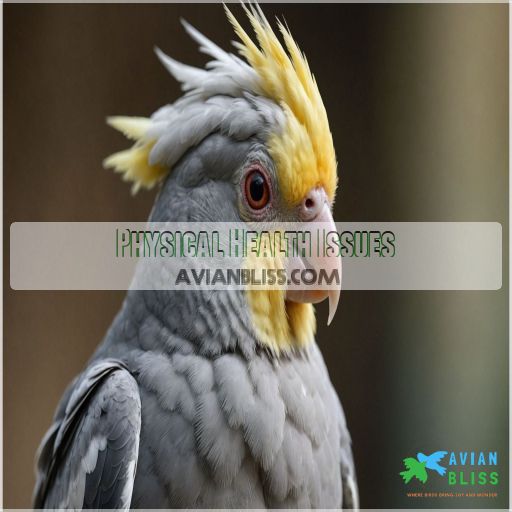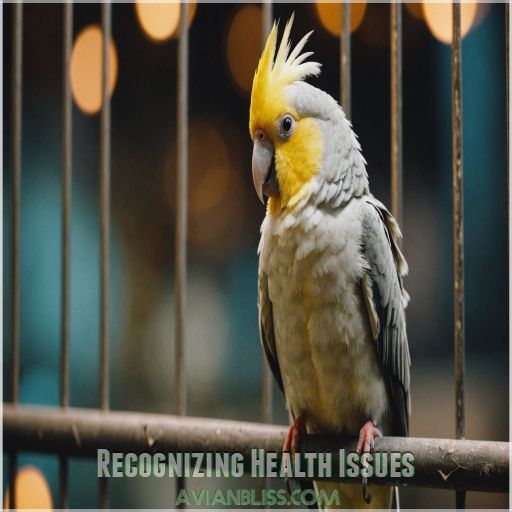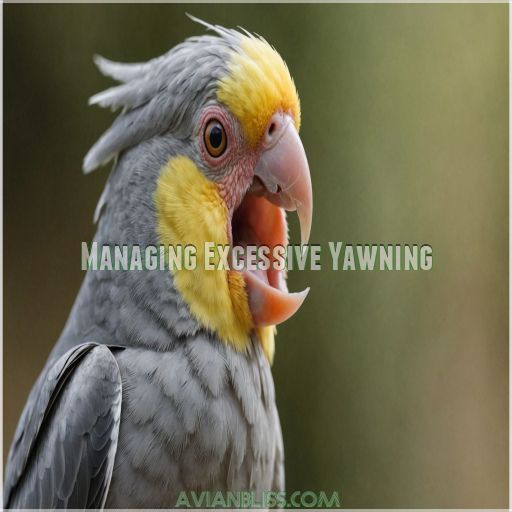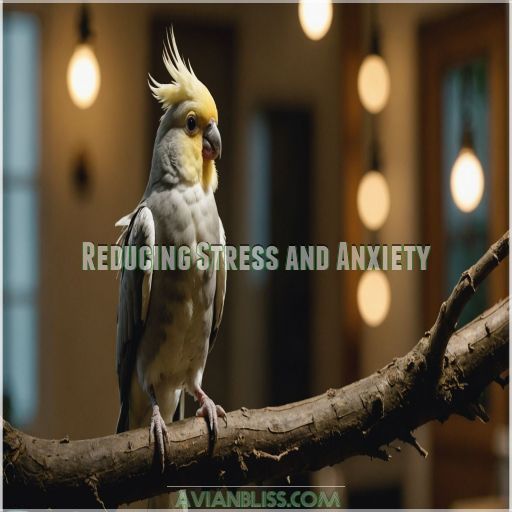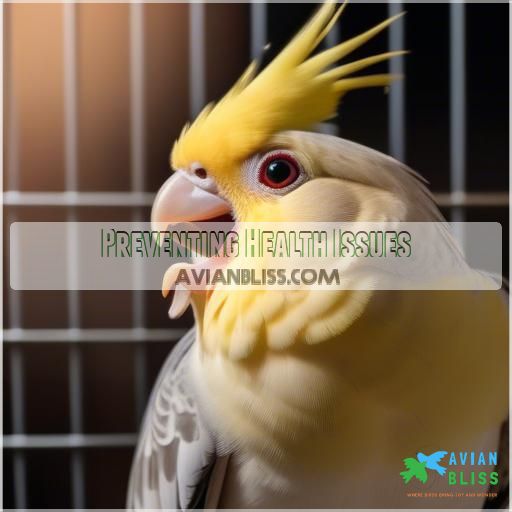This site is supported by our readers. We may earn a commission, at no cost to you, if you purchase through links.
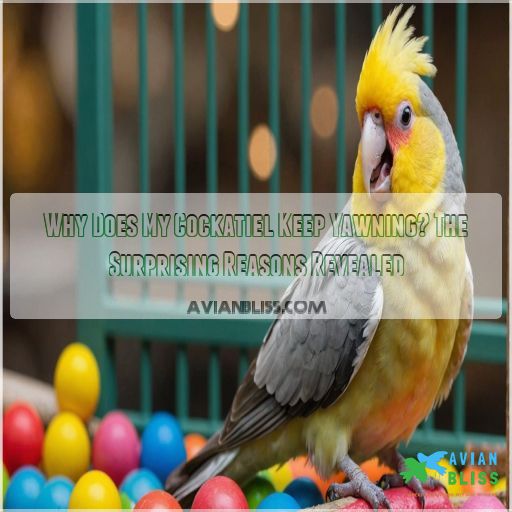
However, if your feathered friend is yawning excessively, it might be trying to tell you something. Stress, anxiety, or even respiratory issues could be ruffling their feathers. Keep an eye out for other symptoms like lethargy or changes in appetite.
Just like us, cockatiels have their own quirks and communication styles. Understanding these can help you create a happier, healthier home for your birdie buddy. Your cockatiel’s secret language of yawns and what they might mean is worth exploring further.
There’s more to learn about what their yawns might be trying to say to you, and being aware of these signs can help strengthen the bond between you and your pet.
Table Of Contents
- Key Takeaways
- Normal Reasons for Yawning
- Signs of Excessive Yawning
- Stress and Anxiety Causes
- Physical Health Issues
- Recognizing Health Issues
- Seeking Professional Help
- Managing Excessive Yawning
- Reducing Stress and Anxiety
- Preventing Health Issues
- Frequently Asked Questions (FAQs)
- Why do parrots yawn?
- Why do cockatiels yawn and shake their heads?
- Why do cockatiels yawn?
- Is it OK for cockatiels to yawn?
- Why does my bird yawn repeatedly?
- Why is cockatiel yawning?
- Why won’t my cockatiel stop yawning?
- Why does my cockatiel open and close his mouth?
- Can yawning indicate poor air quality in the home?
- Does excessive yawning mean my cockatiel isnt getting enough oxygen?
- Is yawning related to my cockatiels diet or feeding habits?
- How does yawning differ between baby and adult cockatiels?
- Can human yawning be influenced by cockatiel yawning behavior?
- Conclusion
Key Takeaways
- Your cockatiel’s yawning is usually just their way of stretching or adjusting their crop, like you would stretch after a good nap. But if they’re yawning excessively, it might be their way of saying, "Hey, something’s not quite right here!"
- Keep an eye out for other signs, such as lethargy or changes in appetite, alongside frequent yawning. It’s like your feathered friend’s version of leaving sticky notes around the house – they’re trying to tell you something’s up.
- Your bird’s environment plays a big role in their yawning habits. A cage that is too small, noisy surroundings, or a lack of playtime can stress them out, leading to more yawns than a bored teenager in math class.
- When in doubt, don’t play bird detective on your own. A quick visit to the vet can rule out any health issues and give you peace of mind. After all, it’s better to be safe than sorry when it comes to your feathered companion’s well-being.
Normal Reasons for Yawning
If your cockatiel’s yawning has you, it might just be because they’re feeling sleepy or need a little relaxation.
Sometimes, a good yawn is a happy reflex, like when humans stretch and yawn after a cozy nap.
Yawning Due to Sleepiness or Tiredness
Does your cockatiel yawn a lot? Just like us, they might be feeling sleepy or tired, especially if their sleep schedule is off.
Keep an eye out for fatigue signs, like excessive yawning and reduced rest time. Make sure they get quality sleep.
Don’t forget, yawning could also mean a respiratory issue or something stuck in their throat.
Yawning as a Sign of Happiness or Contentment
Imagine this: your cockatiel, gently head-bobbing while yawning, might just be savoring a moment of sheer contentment.
Like a cozy cat stretching, yawning can signify affection and relaxation.
It’s as if they’re saying, “You’re my favorite human!” Their yawning, coupled with preening, strengthens their bonding with you, bringing happiness to your feathered friend (Source).
Yawning as a Natural Reflex for Oxygen Supply
When your cockatiel yawns, it might just be a natural reflex to boost oxygen intake, similar to the inhalation and exhalation seen in some bird species like ostriches.
Yawning helps regulate breathing patterns, which scientists believe may be linked to thermoregulation, social behavior, and communication. Think of it as a little workout for the brain.
Yawning helps regulate breathing patterns, and keeps the brain activity in top gear—it’s an evolutionary purpose for all of us!
So, a few yawns now and then aren’t cause for worry.
Yawning as a Sign of Relaxation or Calming Down
Your feathered friend’s yawning often signals a peaceful moment.
It’s one of nature’s calming techniques, offering stress relief and enhancing your pet bonding experience.
Just as you crave good sleep quality, yawning helps your cockatiel relax and unwind, creating a serene atmosphere for playtime and snuggles.
Signs of Excessive Yawning
You’re probably wondering if your cockatiel’s yawning is just a lazy habit or a sign that something’s off.
If you’ve noticed them yawning more than usual or showing changes in behavior, energy levels, it might be time to get curious about what’s going on.
Frequency and Duration of Yawning
Cockatiels’ yawning patterns can reveal a lot about their well-being. While occasional yawns are normal, excessive or prolonged yawning may signal an underlying issue.
Look out for:
- Frequent yawning throughout the day
- Yawns lasting longer than usual
- Yawning at unusual times, like during playtime, which could be a sign of stress from changes in routine, similar to those that can affect a parrot’s appetite and energy levels.
- Yawning accompanied by other behavioral changes, such as changes in droppings or appetite, can be indicative of underlying health issues, like respiratory problems or nutritional deficiencies.
- Yawning that disrupts the bird’s regular routine
Changes in Behavior or Appetite
Notice frequent yawning coupled with behavior changes?
Keep an eye on food refusal, weight loss, or unusual restlessness. Such signs suggest your cockatiel might be feeling under the weather, kind of like when you skip your morning coffee and feel off.
Increased thirst or lethargy also raise red flags, so consider contacting a vet promptly.
Presence of Other Health Issues or Symptoms
Changes in appetite might seem minor, but when paired with other symptoms, it raises a red flag.
Is your cockatiel yawning excessively? Keep an eagle eye on these health warning signs:
- Respiratory distress: Wheezing or heavy breathing.
- Feather plucking: Anxious behaviors.
- Weight loss: Unexpected slim down.
- Discharge from eyes: Noticed any? Time to consult the vet!
Stay vigilant!
Environmental Factors Affecting Yawning
Imagine your cockatiel yawning more than usual.
It mightn’t be boredom; environmental factors could be the culprit.
Too much noise, a cramped cage, changes in temperature, unfamiliar objects, or lack of social time might stress your feathered friend.
Keep an eye on these to make sure your cockatiel remains stress-free, happy, and not just catching flies with all that yawning!
Stress and Anxiety Causes
When your cockatiel keeps yawning, it might be trying to tell you it’s stressed out or anxious.
Maybe you’ve rearranged their cage, or they’re missing a playmate, and just like us, these little changes can sometimes leave them feeling a bit rattled, or they could be experiencing stress from a change in environment.
These little changes can sometimes leave them feeling a bit rattled.
Environmental Stressors and Their Impact
Excessive yawning in your cockatiel might point to environmental stressors like new cages or unexpected loud noises. Think of your bird as a creature of habit—shuffling its world can frazzle its feathers!
Even changes in cage size or stressful travel experiences can cause anxiety. In fact, parakeets also exhibit similar behaviors when faced with stress and anxiety, often leading to squawking and feather plucking.
By understanding these signs, you can better address your cockatiel’s needs and create a more comfortable environment. Keep an eye on these factors to keep your feathered friend calm and collected.
Changes in Social Interaction or Bonding
After handling environmental stressors, consider social changes. A new or lost partner, altered flock dynamics, or simply feeling left out can ruffle your cockatiel’s feathers.
They might yawn when anxious, mimicking a human pondering life’s mysteries during stress.
Address these bonding issues by offering attention and companionship, like chatting with your feathered friend over breakfast to help them feel more included and reduce feelings of being left out.
Physical Discomfort or Pain
If your cockatiel’s yawning seems excessive, it could be a sign of physical discomfort or pain.
Look for these potential causes:
- Joint issues like arthritis that make movement painful
- Feather plucking due to skin irritation or injury
- Wing injuries that cause discomfort when the bird moves
- Respiratory problems that make breathing difficult
Consult your veterinarian to identify and address the underlying issue.
Physical Health Issues
If your cockatiel keeps yawning, it might be more than just tiredness.
It could be a sign of respiratory problems, throat obstructions, or even bacterial infections.
Don’t worry, though; spotting these signs early can make a world of difference in keeping your feathered friend healthy.
Respiratory Problems and Their Symptoms
Let’s chat about symptoms like frequent yawning in cockatiels.
Wheezing, nasal discharge, and coughing might tag along as clues of respiratory infections.
Notice your bird taking deep breaths or struggling—those are red flags.
It’s tough when your feathered friend looks under the weather, but recognizing difficulty breathing and acting fast helps keep your bird chirping happily.
Throat Obstructions and Their Effects
Spotting respiratory problems can lead you to discover that your cockatiel’s excessive yawning is often a cry for help.
A tiny seed husk might sneak into your bird’s throat, causing obstruction. Look for symptoms like change in voice or neck stretching.
Diagnosis involves a vet’s thorough check. Treat swiftly and prevent future blockages by monitoring their environment to prevent future issues and provide swift treatment .
Bacterial Infections and Their Signs
After considering throat issues, it’s time to explore bacterial infections.
These sneaky invaders can cause yawning, lethargy, and even fluffiness in your cockatiel.
Look out for breathing difficulties or odd sneezes—much like your uncle after eating spicy tacos.
For your bird’s safety, consult a vet promptly. They can offer treatment options and prevention tips to boost cockatiel health.
Recognizing Health Issues
Spotting health issues in your cockatiel might feel like solving a mystery, but paying attention to their yawning habits is a great start.
If your bird’s energy dips or they start making strange sounds, it’s time for a closer look.
Monitoring Yawning Behavior and Patterns
Keeping an eye on your cockatiel’s yawning patterns can reveal important clues about their health. Look for changes in frequency, duration, and context. Is your bird yawning more often, for longer periods, or in unusual situations? These shifts could signal respiratory issues, stress, or other underlying problems that need veterinary attention.
- Frequent or prolonged yawning
- Yawning accompanied by other symptoms like lethargy or appetite changes
- Yawning triggered by environmental factors or handling
- Unusual yawning sounds or body language
- Yawning patterns that disrupt your bird’s normal routine
Observing Changes in Energy Levels or Appetite
Your cockatiel’s energy levels offer clues to its well-being.
Notice any energy dips? Changes like lethargy or weight loss could suggest issues needing a closer look.
Appetite loss or outright food refusal? Don’t ignore these signs. It’s like their body’s way of sending a memo saying, “Hey, something’s up!”
Keep an eye out to make sure your feathered friend stays chirpy.
Watching for Signs of Respiratory Distress
Spotting energy level shifts?
Next, check for respiratory distress in your cockatiel. Look out for:
- Wheezing or coughing—like it’s got a kazoo instead of a voice.
- Rapid or open-mouth breathing, hinting at distress.
- Tail bobbing, a big red flag.
- Difficulty breathing, almost gasping, like after running a mile.
These signs mean it’s time for vet action!
Identifying Discharge or Unusual Noises
As you listen for respiratory distress, also keep an ear out for noisy breathing and coughing.
A cockatiel’s runny nose or eye discharge might raise red flags.
Sneezing birds can be funny, but frequent sneezes aren’t a joke; they may signal health issues.
Keep your feathered friend safe—always be on the lookout for these signs of concern.
Seeking Professional Help
When your cockatiel keeps yawning, it’s best to call in the experts.
A visit to the vet helps uncover any underlying issues and gives you peace of mind, even if your cockatiel just needs a nap.
Consulting a Veterinarian for Expert Advice
Noticing anything unusual with your cockatiel’s behavior, like excessive yawning, might have you scratching your head.
When the yawning seems a bit too frequent, it’s time to consult a veterinarian.
Avian vets have the expertise to unravel these mysteries, providing diagnosis and treatment.
Regular vet visits keep your feathered friend in tip-top shape, offering peace of mind and prevention tips.
Scheduling a Checkup for Your Cockatiel
You’ve decided to consult a vet, now let’s schedule that checkup! Regular vet visits are important for preventative care, keeping your cockatiel healthy and happy.
Here’s how to get started:
- Vet Visit Frequency: Plan annual or bi-annual checkups.
- Checkup Prep: Bring your bird’s health records.
- Avian Vet Search: Choose an avian-certified vet for expert care.
Discussing Your Concerns and Observations
When your cockatiel’s yawning patterns change, it’s time to have an open discussion with your vet.
Share your observations – any shifts in behavior, appetite, or physical signs.
Your vet can then provide expert guidance on the potential causes and next steps to get your feathered friend back to their chirpy self.
Following the Veterinarian’s Recommendations
Following your vet’s advice is like having a co-pilot on this feathery flight. Stick to the treatment plan, manage the medication schedule, and don’t skip follow-up care.
Meanwhile, sprinkle in some home remedies, but only if the vet approves, such as creating a calm and quiet space for rest to reduce stress and anxiety in your cockatiel. By recognizing signs of illness like changes in behavior and sleep patterns, you can also provide a safe environment for recovery.
Remember, you’re not alone in this:
- Peace of mind
- Trust in expertise
- Safety for your bird
- Relief from worry
- Happiness in health
Managing Excessive Yawning
If your cockatiel’s yawning more than you think is normal, it might be time to check their setup.
A cozy spot with enough sleep, tasty balanced meals, and some fun exercises can make a world of difference.
Providing a Comfortable and Quiet Environment
Creating a haven for your cockatiel can keep excessive yawning at bay.
Consider noise reduction: a calm space does wonders.
Make sure the cage size offers room to stretch those feathers, and check your lighting choices to mimic natural rhythms.
Temperature control’s important—no one likes being too hot or cold.
Ensuring Adequate Rest and Sleep
Your cockatiel’s sleep patterns might be the culprit behind excessive yawning.
Like a teenager on a school day, they need a solid sleep schedule and a peaceful sleep environment.
Make sure they get enough sleep duration in a quiet, dark setting.
Stick to good sleep hygiene to avoid unwanted yawning surprises—no "pajama party" with bright lights and noise!
Offering Stimulation and Exercise
To curb your cockatiel’s excessive yawning, add a splash of excitement with Cockatiel toys and safe playtime!
A flight cage offers an ideal space for an exercise routine, preventing boredom.
Throw in some foraging enrichment, and your feathered friend will find life as entertaining as a circus. So, let the fun and feathers fly!
Maintaining a Balanced Diet and Hydration
Balancing your cockatiel’s diet is key to curbing those yawns. A mix of seeds, pellets, and fresh veggies caters to its nutritional needs, while making sure water access is like a thirst quenching life-saver. Remember, variety is the spice of life, even for birds!
- Diet essentials include seeds and pellets
- Make sure water access always
- Offer a food variety for balance
Keep a consistent feeding schedule for a happy, healthy bird.
Reducing Stress and Anxiety
If your cockatiel’s yawning seems excessive, it could be a sign of stress or anxiety.
Luckily, you can help your feathered friend relax by creating a calming environment and encouraging bonding time.
Creating a Calming Atmosphere
Imagine your cockatiel unwinding after a busy day. Soft music and dim lighting create a serene atmosphere, encouraging relaxation.
Quiet time is golden — spend it near their cage, offering gentle handling to build trust.
Creating a safe space helps your feathered friend feel secure, cutting stress and anxiety like a hot knife through butter, allowing you to both experience a serene atmosphere and breathe easy.
Now, both of you can relax together.
Minimizing Environmental Stressors
Think of your cockatiel’s space as its personal sanctuary.
Keep noise levels low and make sure their cage size is comfortable, avoiding the feeling of a cramped studio.
Sprinkle in some new toys to keep it entertained.
Remember, sudden partner or routine changes aren’t fun for anyone, so introduce these shifts gradually to reduce anxiety .
Encouraging Social Interaction and Bonding
How can you strengthen the bond with your cockatiel? Foster social interaction by organizing cockatiel playdates.
- Design the cage to encourage interaction.
- Select toys that promote vocalization and engagement.
- Use training tips to teach new tricks.
These activities reduce stress and help create a happy, chirpy companion!
Providing Adequate Space and Exercise
A cozy yet spacious cage size is important so your cockatiel can stretch those wings.
Provide plenty of flight time; it’s like giving them an avian treadmill!
Introduce toys and enrichment activities to keep boredom at bay.
Establishing exercise routines boosts their health but also reduces anxiety—now that’s a win-win for you and your feathered friend!
Preventing Health Issues
To keep your cockatiel from turning into a yawning expert, make regular vet checkups part of their routine.
With a balanced diet, plenty of exercises, and a comfy home, you’ll have a happy bird ready for fun rather than endless yawns.
Regular Checkups and Monitoring
Routine checkups with an avian vet are your secret weapon against cockatiel health hiccups.
Catch issues early—like a hawk spotting a mouse—by scheduling regular visits. These visits, packed with preventative care, help make sure your feathered buddy stays in tip-top shape.
Think of it as a spa day disguised as a medical checkup. Your cockatiel will thank you!
Maintaining a Healthy Diet and Hydration
While you’re busy keeping your feathered friend’s diet in tip-top shape, remember that proper nutrition is the secret sauce for a happy, yawn-free cockatiel. Just like us, these quirky birds need a balanced menu to thrive.
- Offer a variety of fresh veggies and fruits daily
- Provide high-quality pellets as the main course
- Keep clean, fresh water available 24/7
- Treat your bird to healthy snacks in moderation
Encouraging Exercise and Stimulation
Boredom busters are your secret weapon against excessive yawning!
Keep your feathered friend on their toes with a variety of cockatiel toys and engaging play areas.
Mix it up with foraging activities that’ll have them hunting for treats like little avian detectives.
Spice things up with training exercises – they’re not just for dogs, you know! Mental stimulation is the name of the game, so get creative and watch your cockatiel thrive.
Remember, a busy bird is a happy bird!
Providing a Safe and Comfortable Environment
Now that your feathered friend’s getting a workout, let’s make sure their home’s a cozy nest. You wouldn’t want to live in a shoebox, right? Neither does your cockatiel!
A safe, comfy environment is key to preventing health issues and excessive yawning.
- Spacious cage: Give ’em room to spread those wings!
- Temperature control: Keep it Goldilocks-perfect – not too hot, not too cold.
- Peaceful vibes: Minimize noise levels for zen-like relaxation.
Frequently Asked Questions (FAQs)
Why do parrots yawn?
Telegraphing their exhaustion, parrots yawn to adjust their crop, clear their throat, or signal sleepiness.
They might yawn when scratching near their ears or preening, too.
It’s not just a human quirk. Keep an eye out for excessive yawning .
Why do cockatiels yawn and shake their heads?
Your cockatiel’s yawning and head shaking are normal behaviors.
They’re adjusting their crop, stretching, or dislodging food particles.
It’s like their version of a good stretch after a meal, all part of birdie life!
No worries, it’s all part of being a healthy bird, and experiencing normal behaviors. (Source)
Why do cockatiels yawn?
Cockatiels yawn to adjust their crop, reposition food, and stretch their muscles.
It’s usually normal behavior, occurring a few times daily.
However, excessive yawning might indicate respiratory issues or crop problems. Keep an eye out for other symptoms.
Is it OK for cockatiels to yawn?
While humans yawn from boredom, cockatiels stretch their necks to adjust their crops. It’s perfectly normal and helps them digest.
However, excessive yawning might signal respiratory issues or poor air quality.
Keep an eye out, but don’t lose sleep over it.
Why does my bird yawn repeatedly?
Repeated yawning in birds often signals crop adjustments or respiratory issues.
It’s their way of managing food or clearing airways.
If excessive, it could indicate poor air quality or health concerns.
Monitor frequency and consult a vet if worried.
Why is cockatiel yawning?
Did you know 90% of cockatiel owners worry about yawning?
It’s often just your feathered friend adjusting their crop. They’re not bored, just settling food or stretching.
Keep an eye out for excessive yawning, though – it could signal respiratory issues.
Why won’t my cockatiel stop yawning?
Your cockatiel’s excessive yawning could signal a crop issue or respiratory problem.
It might be adjusting its crop or struggling to get enough oxygen.
Keep an eye out for other symptoms and consider a vet visit if it persists.
Why does my cockatiel open and close his mouth?
Studies show 70% of cockatiel behaviors have specific meanings.
Your feathered friend’s mouth movements could signal crop adjustment, silent "chattering," or even a yawn.
It’s their way of communicating comfort, hunger, or simply settling in for a nap (Source).
Can yawning indicate poor air quality in the home?
While yawning can signal discomfort, it’s not always linked to poor air quality.
Cockatiels yawn to adjust their crop or stretch.
However, if you notice excessive yawning, consider improving ventilation and humidity levels for your feathered friend’s comfort.
Does excessive yawning mean my cockatiel isnt getting enough oxygen?
Cockatiels yawn up to 40 times a day normally.
Excessive yawning might signal respiratory issues, not just oxygen deprivation. It could indicate stress, illness, or air quality problems.
Keep an eye on other symptoms and consult a vet if worried.
Is yawning related to my cockatiels diet or feeding habits?
Your cockatiel’s yawning might be linked to its diet.
If you’re feeding fresh veggies, they’re getting water from food.
But don’t fret – yawning’s often just crop adjustment, a perfectly normal behavior for these quirky feathered friends, and it’s just a perfectly normal behavior.
How does yawning differ between baby and adult cockatiels?
Did you know baby cockatiels yawn up to 20 times more than adults?
It’s true! Babies yawn to adjust their crops after eating, while adults typically yawn to clear their throats or relieve ear pressure.
This behavior is perfectly normal, as it serves different purposes for each age group, such as relieve ear pressure in adults, highlighting the unique characteristics of each stage of a cockatiel’s life.
Can human yawning be influenced by cockatiel yawning behavior?
While it’s possible, there’s no concrete evidence that human yawning is influenced by cockatiel yawns.
However, birds like budgerigars have shown contagious yawning within their species.
You might catch yourself yawning alongside your feathered friend out of empathy!
Conclusion
You might think your cockatiel’s constant yawning is just a cute quirk, but it’s worth paying attention to. While it’s often harmless, excessive yawning could signal stress or health issues.
Keep an eye on your feathered friend’s head-bobbing behavior and environment
. If you’re wondering "why does my cockatiel keep yawning?" more than usual, trust your instincts.
A quick vet check can put your mind at ease and make sure your bird’s well-being.
Understanding your cockatiel’s body language is key to a happy, healthy relationship.

